Swimming: A race away from retirement, she booked an Olympics spot for Singapore and made history
In the third feature in a series of profiles of TeamSG competitors who have qualified for the Olympic Games, CNA speaks to an open water swimmer used to going against the current - both in and out of the water.
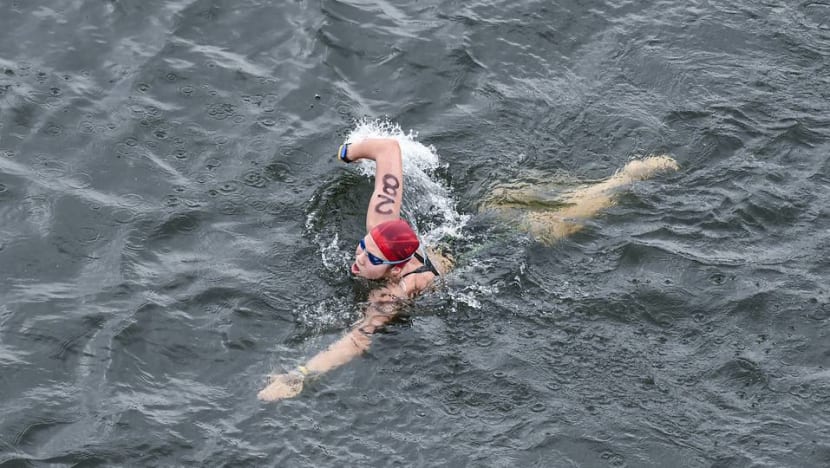
Chantal Liew competes at the 2017 SEA Games. (Photo: Sport Singapore/Stefanus Ian)
SINGAPORE: The waves are rough, her mouth is dry, and a slight panic is welling.
Pushed up against a troublesome buoy in 20 degrees Celsius water off the coast of Portugal, Chantal Liew sees her competition disappear ahead.
She is stuck. They are not.
Liew is not just in any race. She is in the race of her life. And it could be her last, should she fail to make the cut for the Olympic Games.
“If Setubal (in Portugal) was going to be the last race, it was going to be the last race. And that's why I wanted that race to be as perfect as it could have been,” she recalled.
“I wanted to make sure I got everything right during that race.”
Yet, for these agonising few seconds, it didn’t really seem that was possible.
‘MY BLOOD WAS BOILING’
The text message was a blunt one.
“What … are you doing with your life?” asked an acquaintance.
The words may not have been intended to hurt, but they were no less insulting.
“How can you not be offended? You're putting everything you have on the line for a chance that less than one per cent of the population has, and someone just thinks you are literally doing nothing with your life,” Liew told CNA.
This happened last year, and Liew was juggling her undergraduate studies, an internship and her regular training sessions.
As she ramped up her preparations for the Games, she had unloaded her university modules in order to shoulder the burden better.
Not that everybody understood.
“I replied: ‘I'm trying to qualify for Olympics’ and he asked: “But you train 24/7?’” recalled Liew. “My blood was boiling.”
“It became an inside joke with the swimmers because we're all equally angry because (if) you attack me, you attack every other athlete in Singapore that is trying to qualify for the Olympics,” she noted.
READ: ‘I owe everything to my mum and dad’: A Singaporean fencer makes history and keeps an Olympics promise
But at the same time, a nagging thought remained.
“As much as I tried to make a joke about it with my friends, there was always that thought in my head like: ‘Okay, if I don't make the Olympics, then I really have wasted this entire year of my life doing nothing when I could have started work’,” she said.
“But it's not good to dwell on things like that. If anything, (the question) ‘What are you doing with your life?’ spurred me on doing training, because I just wanted to have something to answer him (with).”
CHANGE THE ONLY CONSTANT
Gone is the controlled environment of the sterile swimming pool.
No gleaming lanes of blue, no bright lane markers of red, no faint whiff of chlorine in the air.
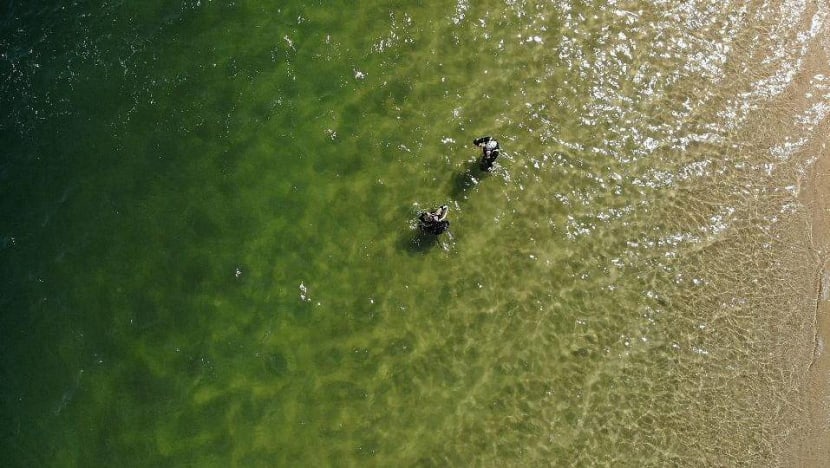
In contrast, the only constant in open water swimming is change. Winds change, waves change, temperatures change.
“Open water is very dependent on a lot of choices that you have to make on the day itself, you need to watch your competitors, you need to watch the elements,” explained Liew.
“I think it keeps things very interesting and it really is the best athlete on the day itself (that wins) sort of situation.”
A former backstroke swimmer, Liew represented Singapore in the 2015 SEA Games.
When she failed to qualify for the next edition of the Games in her pet event - the 200m backstroke - she decided to give open water swimming a shot instead.
And it helped that she wasn’t unfamiliar with open water swimming. Liew had done her high school studies in Phuket, Thailand and her former coach had talked up open water swimming in the past.
Having also watched former teammate Hendrick Faber compete at a number of meets, Liew never thought the discipline was for her. But slowly, she changed her mind.
“When 2017 came around, I was like: ‘Oh okay, I guess, if Hendrick does it, it can’t be that hard'. I'd seen Hendrick do it so many times that the idea wasn't completely foreign to me,” said Liew.
“I also do a lot of scuba diving in the open sea, so I wasn't uncomfortable with swimming in the ocean. So I thought would just try and make it by SEA Games since I didn't make it in the pool.”
And in December later that year, Liew would go on to claim bronze - the first ever medal for Singapore in the sport - at the 10km open water event at Putrajaya, Malaysia.
The medal was later upgraded to a silver as the second placed Thai athlete tested positive for a banned substance.
But the gleaming metal wasn’t Liew’s main source of affirmation. Rather it was a conversation with event winner Heidi Gan, a two-time Olympian for host nation Malaysia.
“I had a sit down with her after the race … I was just trying to get a sense of where she was at, and she told me that she felt I had more potential in open water than with regular swimming and she thought that I should actually give it a try and be more open to doing (open water),” recalled Liew.
“She sort of gave me an insight as to how she approached her races and that really intrigued me because it was a very different point of view to I was used to with regular pool swimming, so I thought it was very interesting and I still view her as a huge role model.”
OBSTACLES IN AND OUT OF THE WATER
It isn’t only the vast blue expanse that an open water swimmer has to contend with. There are jellyfish to repel, competitors to battle, oil slicks to avoid.
Liew recalled a casual swim off Singapore's East Coast where her elbow bumped into something hard. The next day, her arm erupted in tiny pustules.
Till this day, she has no idea what the culprit was.
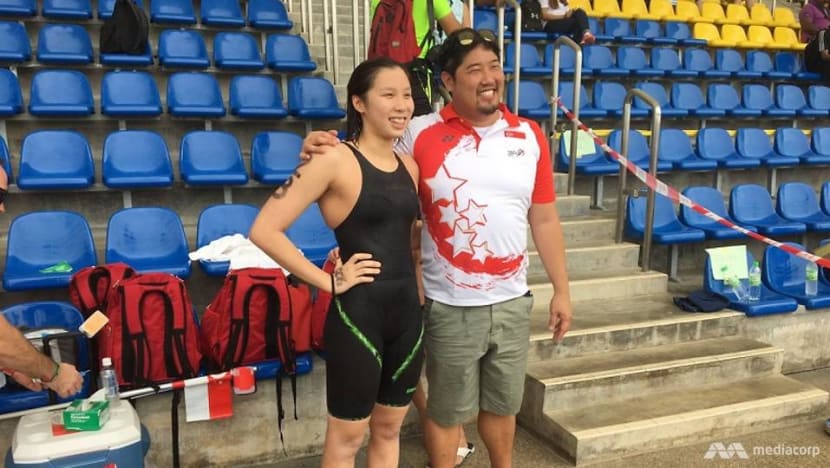
“In Singapore, there were box jellyfish as well but I didn't get stung, luckily. When I was racing in Australia, I got stung pretty badly - on my neck and on my arms,” she recalled.
“But when you race and you get stung by jellyfish, it is not too bad. You can generally continue swimming the race, it just feels like it stings a bit. And then after a while, I guess with the adrenalin in your brain focusing on other things, you don't really feel the pain that much.”
As competitors leap off pontoons and jostle for the best positions, there’s all sorts of kicking, pushing and grabbing that goes on under water, added Liew.
Open water swimmers call this “the washing machine”.
“You're standing in a line and you have one objective which is to get to that first turning buoy ... And so when that happens, all the girls jump in and they want to congregate into the best possible line to take,” she explained.
“It gets very violent, you get kicked … I've come out of some races with a swollen jaw.”
Competitors don't set out to hurt one another, Liew is quick to add - it's just part and parcel of open water racing.
“There's just a lot more things to think about during an open water race and I think that's where people have the misconception that open water races are boring, but I think for the athlete, it is a lot more thought provoking than pool swimming,” she added.
“Everything is very constant in the pool, whereas out there anything can change at the drop of a hat. So you need to be constantly alert.”
It isn’t just obstacles out at sea that Liew has faced. Juggling studies and training has been no mean feat.
Liew recalled her university experience and how she was not allowed to take her exams earlier in order to attend a training camp prior to the 2017 SEA Games.
“How hard is it for an educational institution to push an exam forward or back a couple of days?” she noted.
She is candid about the reality of being an athlete.
“It's just the societal expectations in Singapore, where ... being an athlete, it is not one of the most respected jobs, because at the end of the day, you’re not making a lot of money,” she said.
READ: From turning cartwheels at home to an Olympics place: A gymnast’s triumph over injuries
“It is a very capitalistic mindset we have here in Singapore and in the local university everyone is trying to one up each other to get a job. The main thing you want to do by the end of graduation, is to have a job.
“So it's tough to be an athlete in a society like that where the measurement of success is how much money you're making.”
THE FINAL PUSH
On a sunny morning off the Portuguese coast, Liew finds herself with a shot at the Olympics.
A couple of strokes get her free of the buoy, and a short sprint brings within striking distance of her closest competitor, Hong Kong’s Nip Tsz Yin.
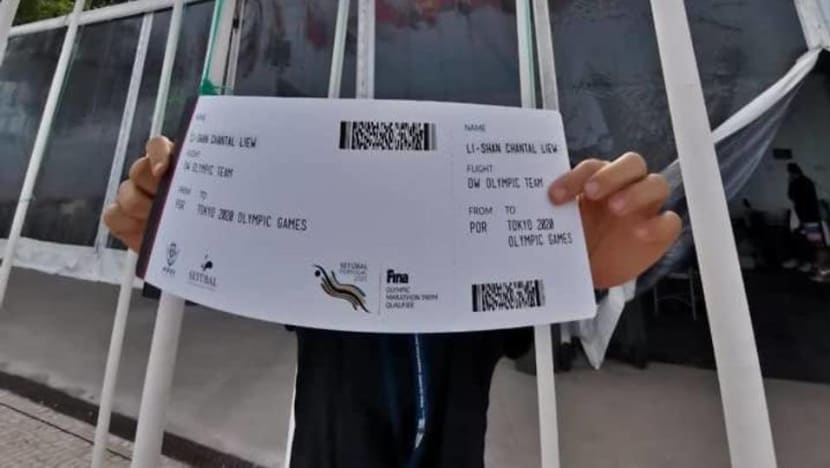
“It’s like one of those things where it's just unlucky where you catch a wrong wave and you get pushed up against the buoy and then it sort of sucks you in ... I would say the whole ordeal wasn't very long, it was like maybe five to seven seconds,” she recalled.
“So, it wasn't that huge of a lead that she had built up on me so I sprinted for about 10, 15 meters and I managed to catch up with her.”
The equation is simple, beat Nip and Liew qualifies for the Olympic Games as the best Asian finisher behind the two Japanese swimmers who had already secured spots.
It is a calculation that Liew is familiar with. After all, what had factored into her decision in August 2019 to try to push for Games qualification was the fact that she had a chance at an Asian continental spot.
“So then that's when I was like: ‘Okay maybe I have a chance at this, maybe let's attempt it. If not I would have retired that same year.”
The odds are stacked against her - she gives herself less than a 30 per cent chance of succeeding. Her coach Marcus Cheah, the optimist to her realist, says her chances stand at 50 per cent.
“The biggest thing on my mind was that I wanted to try before I retired, because I don't want to retire with the thought on my mind - what if this? What if that?” she said.
“You don't want to retire with thoughts like that, because it doesn't feel good and you sort of know that you didn't give it your best when you had the chance. That was what pushed me to want to give it one last shot.”
Liew slices through the water, surging ahead of Nip. Where she used to feel the Hong Kong swimmer’s hands brushing her feet, there is no longer any sign of that.
She is ahead.
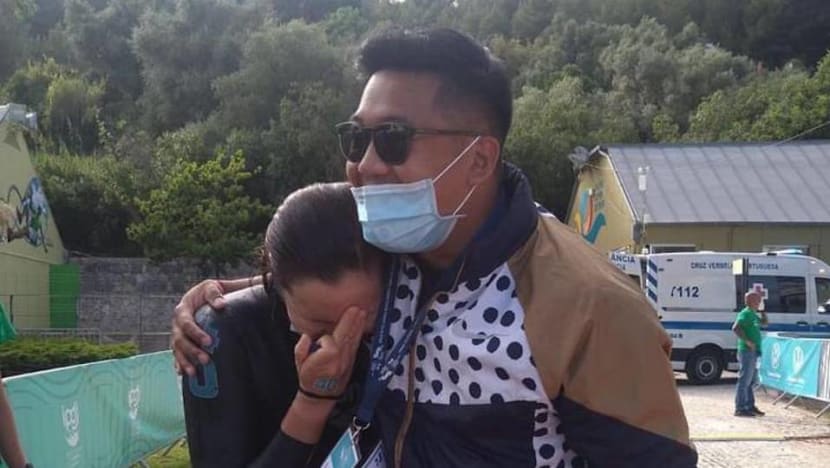
“Twenty meters, it's a decent gap, you would have to sprint ... to make up that 20 meter gap. And I don't think that she had it in her so I just continued to push the pace,” recalled Liew.
“I think it also broke her, because the gap became bigger and bigger, eventually became a two minute gap.”
The 22-year-old who first dreamed of being an Olympian 17 years ago is now going to be one.
“When I was young and I was doing pool swimming, it never occurred to me that I could one day become an Olympian and so now that I am going to the Olympics, I guess it's crazy. But my advice to anyone or any young kid who's doing sports … would be to never say no to any opportunity because you never know where it could take you,” said Liew.
Cheah described the qualification as “icing on the cake” for himself and Liew, after all the trials, tribulations, and challenges brought about by training during a pandemic.
“There were moments when, during the preparation stages, where we almost had to force ourselves to be positive. And I think that was one of the biggest struggles that an athlete has to go through. We take for granted when COVID(-19) wasn't here, and everything was smooth and going to the pool and training day in day out was just normal,” he recalled.
“It was definitely something that was an icing on the cake, knowing that with whatever that we have done, whatever we have gone through, she still managed to qualify for the Olympics and that was something special.”
If she had not stepped outside her comfort zone, Liew believes she would not have reached the milestone.
“If I had continued with my vein of thought like … I'm a pool swimmer, I’m never going to do open water, I wouldn't be here. I wouldn't be where I am today,’ she added.
“Trying new things, stepping out of your comfort zone is one of the most important things.”
READ: Swimming: Chantal Liew qualifies for Olympics, makes history for Singapore
So go ahead. Ask Liew what she is doing with her life.
The answer is plain and simple - she’s qualified for the Olympic Games.
Now, she gets a shot at one final race.
As Singapore’s Olympics Network, Mediacorp will be bringing you the widest coverage of Tokyo 2020. Go to mediacorp.sg/tokyo2020 for more details now.












